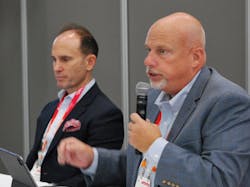Supply chains receiving AI attention just in time
“Early is on time, on time is late, and late is unacceptable.” This famous phrase, coined by Eric Jerome Dickey in his book, “Sleeping with Strangers,” and made famous in the movie of the same name, has become a mantra of industry. But a global interruption in supply chains has forced manufacturing to hit the pause button and reinforce logistics dependability.
“How do we build a resilient supply chain? What have we been doing to accelerate our recovery?” asked Bob Buttermore, senior vice president, chief supply chain officer, Rockwell Automation, during a press conference at Automation Fair 2023 this week in Boston. Buttermore cited three categories of supply chain resilience that Rockwell Automation has identified:
1. Design resilience. “We’ve redesigned our product lines to incorporate redundancy and created a design-for-resilience process,” said Buttermore.
2. Supplier resilience. “We’ve put inventory and redundancy in place,” he continued.
3. Enterprise capacity. “Inventory needs to be kept at a healthy stock level, and we’re building out our distribution-center network,” Buttermore added.
Five elements—engaged team, customer drive, connected supply chain, sustainability and resilience—are at the forefront of Rockwell Automation’s vision for reimagining the supply chain, explained Buttermore. “The engaged team is how we create an environment where people think it’s the best place to work,” he said. “Customer drive is for superior service levels. The connected supply chain means building out a global design optimization network, digital transformation and connected workers. Sustainability programs focus on scopes 1, 2 and 3.”
Of course, resilience is critical. “We continue to build out capacity,” noted Buttermore. “We’re building out our infrastructure. And we’re working with our suppliers to manage the next generation of what the market gives us.”
Rockwell Automation has spent a lot of time talking about and innovating in supply-chain improvement, explained Brian Shepherd, senior vice president, software and control, Rockwell Automation. “One of the set of technologies we’re bringing to market is artificial intelligence, or AI-powered solutions for supply chain,” he said. “It started in 2022 with the release of AI-powered demand planning in Plex, our manufacturing-execution-system (MES) solution. It’s the most popular, most widely used software as a service (SaaS)-based solution in the world. We implemented machine learning (ML)/AI to help our customers do a better job of forecasting demand, which improved between 5% and 30%.” This first step is the Plex DemandCaster.
Up next: Finite Scheduler
“We’re now working on a Finite Scheduler to optimize plant-floor scheduling; it’s how routings work through the factory,” explained Shepherd. Finite Scheduler is targeted at discrete and hybrid industries, where changeovers and startups are common, and is due for release in 2024.
Finally, Rockwell Automation’s acquisition of Clearpath Robotics’ OTTO Motors will bring smart production flow and autonomous integration with Finite Scheduler.
To prove out its capabilities, Finite Scheduler is being implemented in Rockwell Automation’s low-voltage motor-control-center (MCC) plant in Richland Center, Wisconsin, which contains seven factories. “It takes our customer requirements and hands them off to the factories to build,” said Buttermore. “It’s the most complex material routing in our network, bringing all of those assemblies together at the right time to deliver on the promised customer delivery date. This will help us fine-tune our scheduling for faster flow, higher inventory utilization and shorter lead times for customers.”

